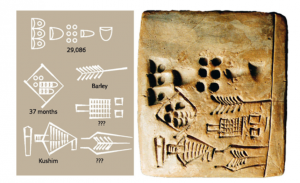
My starting point is simple: on the long run, any activity only exists if it responds to a need of society (or large parts of society) – in other words, if it creates social value. That means accounting and accountants must be very useful as they have been around for a while.
The date that most people have in mind is 1494 when a monk, Luca Pacioli (Leonardo), described double entry accounting in his book Summa de Arithmetica, Geometria, Proportioni et Proportionalità (Particularis de Computis et Scripturis).
|
But accounting records are much older, more than 7,000 years when ancient Mesopotamians and Sumerians held lists of expenditures and goods received and traded (see Kushim, the first name recorded in history). And because accounting is not only for the benefit of owners and traders but fulfils a public interest function, soon after came the need for assurance. |
 |
As for audit, many hold that auditing was born in the UK in the 14th century where the need to audit government expenditure appeared. Others would say that audit originates in the 4th century BC, Egyptians and Babylonians had systems to verify movements in and out of warehouses. The report on the verification – which apparently gave birth to the word “auditor” – was delivered orally.
Today accountants are still measuring and reporting, and auditors are still providing assurance. They’ve gone a long way adapting from the abacus to the spreadsheet; and now they are bravely entering the world of data analytics and artificial intelligence.
So why accountants still exist? There is no doubt that since the development of modern capitalism, the accountancy profession has been playing and still do play an instrumental role to:
Both critics and supporters of the accountancy profession say the accountants should “do things differently”. But I think we have an even more important question: what is more to do? I will explore these two aspects in a later blog. To put it in other words: what are the new social demands that underpins the profession’s license to operate?